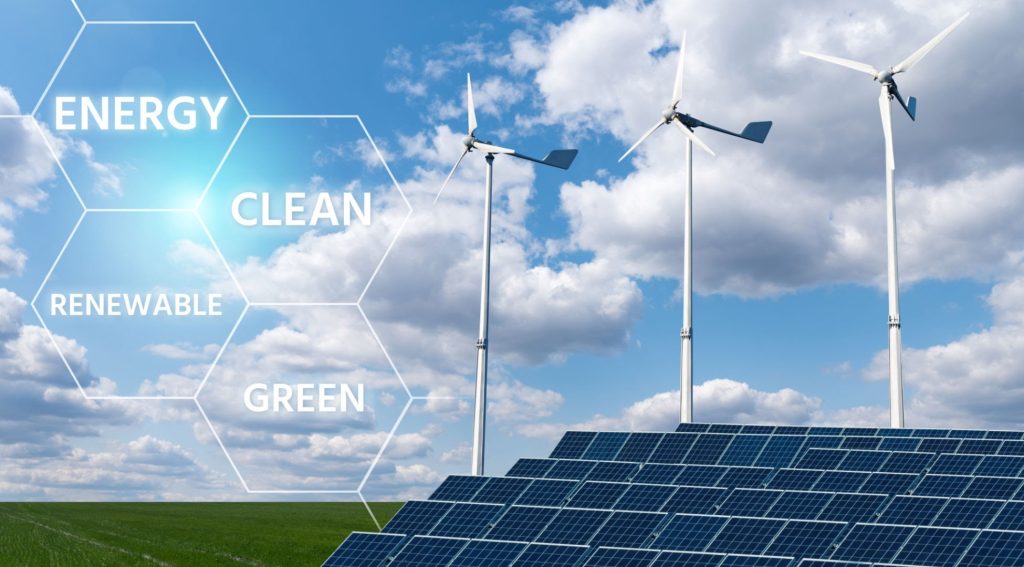In a concerted effort to meet its climate commitments, India is implementing several new policies and schemes to accelerate its transition to a green economy. The strategies are designed to make renewable energy more affordable, boost domestic manufacturing, and decarbonize key industries.
The GST Council rationalizes GST rates on renewable energy devices from 12% to 5%:
- The reform aims to reduce the cost of clean energy projects, making electricity more affordable for all.
- Households will save about ₹9,000–10,500 on a typical 3 kW rooftop solar system under the PM Surya Ghar: Muft Bijli Yojana.
- Farmers under the PM-KUSUM scheme will save approximately ₹17,500 on a 5 HP solar pump, with a collective savings of ₹1,750 crore on 10 lakh pumps.
- The GST cut is also expected to boost domestic manufacturing by reducing module and component costs by 3-4% and could generate 5–7 lakh green jobs over the next decade.
- The new rates will be effective from September 22, 2025.
India Considering Re-tendering 40 GW of Stalled Renewable Projects, Virtual PPAs:
- The projects, which include both solar and wind capacity, are stuck because they lack Power Purchase Agreements (PPAs).
- The re-bidding process will only occur if ongoing marketing efforts to find buyers for the projects are unsuccessful.
- The Central Electricity Regulatory Commission (CERC) is expected to soon release final guidelines for Virtual Power Purchase Agreements (VPPAs).
- VPPAs are financial contracts that allow corporate buyers to support renewable projects and acquire renewable energy certificates without physically purchasing the electricity.
- The new framework for VPPAs is seen as a potential solution to unlock financing for the stranded 40 GW of projects and address concerns related to payment delays from traditional power distribution companies.
India Notifies National Geothermal Policy to Drive Net-Zero Goal:
- The policy aims to harness India’s untapped geothermal resources for both power generation and direct-use applications like district heating and cooling, agriculture, and tourism.
- Key features include promoting R&D, international collaboration, repurposing existing oil and gas infrastructure, and building a public-private ecosystem.
- The Ministry of New and Renewable Energy (MNRE) has already sanctioned five pilot projects to assess the viability of geothermal energy across the country.
Government Unveils ₹5,000 Crore Scheme to Decarbonize India’s Steel Sector:
- The government is developing a ₹5,000 crore scheme, named the National Mission for Sustainable Steel, to promote the use of clean technologies in steel production.
- The scheme will provide incentives to all steelmakers in the country based on their success in reducing carbon emissions year-on-year.
- Approximately 75-80% of the funds are specifically allocated for secondary steel players.
- The initiative aims to help the steel industry, which is a major contributor to India’s greenhouse gas emissions, transition towards a more sustainable future.
Kerala Drafts Green Hydrogen Policy:
- The draft policy, prepared by the Agency for New and Renewable Energy Research and Technology (ANERT), is currently under review.
- Vision & Timelines: Kerala has set an ambitious target to become a green hydrogen and ammonia export hub by 2040. The state aims for 100% domestic consumption of green hydrogen and ammonia by then, with a projected demand of 0.155 million tons per year. A key intermediate goal is a 10% green hydrogen blend in city gas distribution networks by 2030.
Financial & Cost Targets: The state plans to reduce the cost of green hydrogen to ₹200 per kg by 2030, which represents a 50% cost reduction from current levels, with a long-term goal of a 75% reduction. To achieve this, the government is offering a 25% CAPEX subsidy for the first 100 MW of electrolyzer capacity and has earmarked ₹50 crore for subsidizing production costs.
Key Initiatives & Infrastructure: The state is developing a “Hydrogen Valley” connecting Vizhinjam to Kochi and establishing a dedicated Hydrogen Hub in Kochi. Pilot projects are underway to demonstrate the entire green hydrogen value chain, including production, storage, and refueling infrastructure for mobility applications like KSRTC buses and Kochi Metro.
Supporting Ecosystem: The Agency for New and Renewable Energy Research and Technology (ANERT) is the nodal agency for these projects. Key partnerships include public sector companies like BPCL and Cochin Shipyard, as well as research collaborations with institutions like IIT Madras.
Tamil Nadu Pioneers India’s First State-Level EV Charging Guidelines
- The new framework aims to standardize charging infrastructure, simplify the approval process, and promote the use of renewable energy for charging to reduce grid stress.
- The guidelines were developed by several state departments and organizations, with technical support from ITDP India.
- A pilot rollout of the new guidelines will begin in six cities: Chennai, Coimbatore, Madurai, Salem, Tiruchy, and Tirunelveli.
- The initiative is a major step towards boosting EV adoption in the state and will serve as a model for other states to follow.












